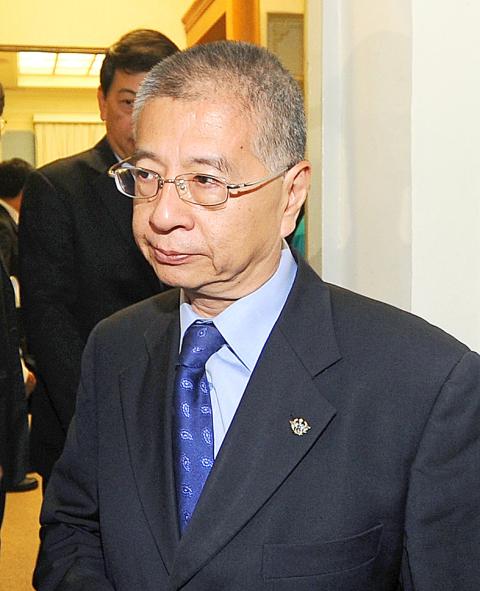Provocations and tension from China are on the rise, but Taiwan is always prepared to defend itself — with or without US help — former minister of national defense Andrew Yang (楊念祖) told a Washington conference on Thursday.
“We always assume that defending ourselves is our own responsibility,” Yang said.
Now an assistant professor at National Sun Yat-sen University, Yang was answering a question as to whether Taiwan had an “unrealistic expectation” about when US help would arrive — or even if it would arrive at all — in the case of a Chinese invasion.

Photo: Taipei Times
“I get asked this question all the time,” he said.
Yang said that as a “responsible, accountable government,” Taipei had to assume it might have to stand alone.
He repeated that in terms of national defense policy, the nation had to take responsibility for itself.
“It is a commitment we have made to our own survival and to our people, and that is very important,” Yang said.
He also told the Jamestown Foundation’s fifth annual China Defense and Security Conference held at the Carnegie Endowment that cybersecurity was “high on the agenda” in terms of defense.
Yang said that Taiwan faced millions of cyberattacks from China and that they came on a daily basis.
He said that Chinese expansion of air and naval activities in the East and South China seas added tension and the threat of escalation to the region.
“Taiwan inevitably is facing challenges and threats in the course of military and security game changes,” he said.
In addition, Taiwan’s challenges and threats were “more imminent” than those faced by other US allies in the region, Yang said.
The military threat from China has remained a daily reality, he said.
“Beijing still holds the option to employ the use of force to achieve political unification,” Yang said.
In a paper prepared for the conference, Yang said that Taiwan and the US shared common concerns regarding the strategic and security situation, particularly China’s increasing naval and air power projection into the East China Sea.

‘FORM OF PROTEST’: The German Institute Taipei said it was ‘shocked’ to see Nazi symbolism used in connection with political aims as it condemned the incident Sung Chien-liang (宋建樑), who led efforts to recall Democratic Progressive Party (DPP) Legislator Lee Kun-cheng (李坤城), was released on bail of NT$80,000 yesterday amid an outcry over a Nazi armband he wore to questioning the night before. Sung arrived at the New Taipei City District Prosecutors’ Office for questioning in a recall petition forgery case on Tuesday night wearing a red armband bearing a swastika, carrying a copy of Adolf Hitler’s Mein Kampf and giving a Nazi salute. Sung left the building at 1:15am without the armband and apparently covering the book with a coat. This is a serious international scandal and Chinese

PERSONAL DATA: The implicated KMT members allegedly compiled their petitions by copying names from party lists without the consent of the people concerned Judicial authorities searched six locations yesterday and questioned six people, including one elderly Chinese Nationalist Party (KMT) member and five KMT Youth League associates, about alleged signature forgery and fraud relating to their recall efforts against two Democratic Progressive Party (DPP) legislators. After launching a probe into alleged signature forgery and related fraud in the KMT’s recall effort, prosecutors received a number of complaints, including about one petition that had 1,748 signatures of voters whose family members said they had already passed away, and also voters who said they did not approve the use of their name, Taipei Deputy Chief Prosecutor

UNDER ATTACK: Raymond Greene said there were 412 billion malicious threats in the Asia-Pacific region in the first half of 2023, with 55 percent targeting Taiwan Taiwan not only faces military intimidation from China, but is also on the front line of global cybersecurity threats, and it is taking action to counter those attacks, President William Lai (賴清德) said yesterday. Speaking at the opening of this year’s Cybersec Expo in Taipei, the president assured foreign diplomats and exhibitors that Taiwan remained committed to strengthening its defense against cyberattacks and enhancing the resilience of its digital infrastructure. Lai referenced a report from the National Security Bureau (NSB) indicating that the Government Service Network faced an average of 2.4 million intrusion attempts daily last year, more than double the figure

COUNTERINTELLIGENCE TRAINING: The ministry said 87.5 percent of the apprehended Chinese agents were reported by service members they tried to lure into becoming spies Taiwanese organized crime, illegal money lenders, temples and civic groups are complicit in Beijing’s infiltration of the armed forces, the Ministry of National Defense (MND) said in a report yesterday. Retired service members who had been turned to Beijing’s cause mainly relied on those channels to infiltrate the Taiwanese military, according to the report to be submitted to lawmakers ahead of tomorrow’s hearing on Chinese espionage in the military. Chinese intelligence typically used blackmail, Internet-based communications, bribery or debts to loan sharks to leverage active service personnel to do its bidding, it said. China’s main goals are to collect intelligence, and develop a